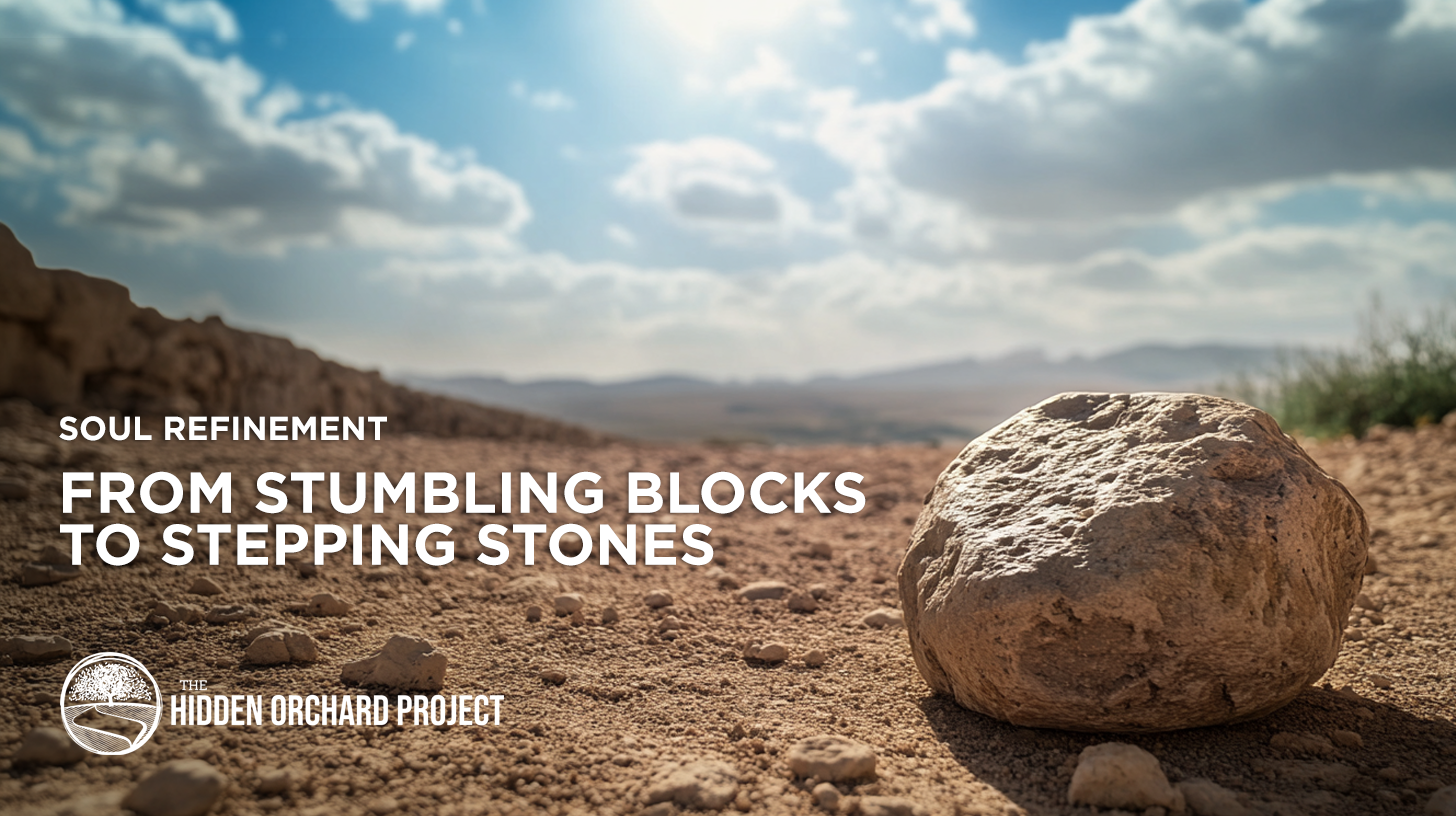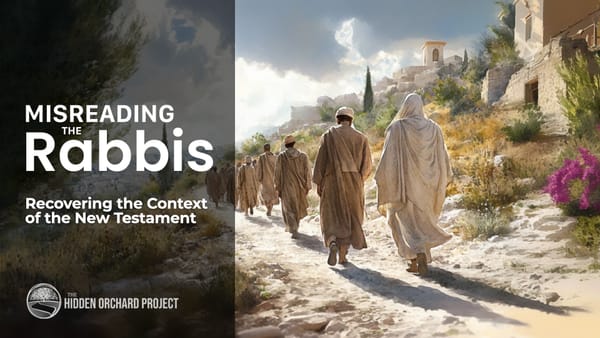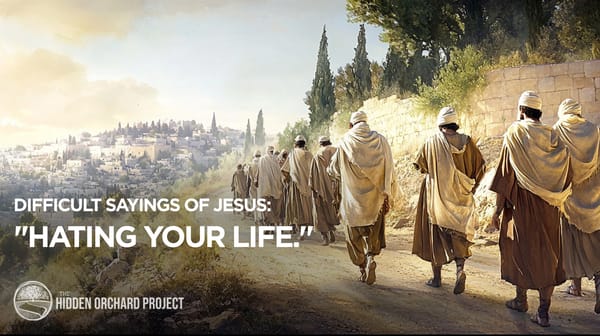Soul Refinement - From Stumbling Blocks to Stepping Stones
In this article, we will explore the dimensions of the prohibition against causing others to stumble. It is a recurring concept in the Talmud and a teaching forwarded by Jesus.

As we strive to better ourselves through the teachings of the Bible, one dimension that can be easily overlooked is the impression we leave on others in the process.
You might be thinking, it's difficult enough to manage my own thoughts, now I have to consider what others think? Well, yes.
Stumbling Others
Known in Hebrew as "Lifnei Iver" (לִפְנֵי עִוֵּר), this concept relates to the various ways we may inadvertently lead others into error.
In a literal sense, Lifney means 'in front of', and Iver means 'blind'. In Leviticus, we read:
You shall not insult the deaf, or place a stumbling block before the blind (וְלִפְנֵי עִוֵּר). You shall fear your G_D"
- Leviticus 19:14
While this seems like a specific application, many considerations stem from this idea, setting the foundation for our responsibility to consider others.
In addition, this prohibition can be expanded broadly as a caution against; giving bad advice, taking advantage of someone's ignorance, and any behaviors that lead people to sin.
Jesus also taught that on this idea, saying:
Woe to the world because of stumbling blocks! It is necessary that stumbling blocks come, but woe to the person through whom they come
- Matthew 18:7
Thinking Ahead
What makes this prohibition particularly challenging is that it not only requires us to be careful with our words and deeds, but it also involves second-order thinking.
Second-order thinking is the process of exploring the potential logical outcomes of an action. The Talmud often demonstrates this kind of cause-and-effect thinking often, aiming to anticipate the scenarios that might arise from a ruling.
For example, many Torah prohibitions have been guarded by 'fences', additional safeguards that seek to protect from the cause-effect scenarios that could result in an inadvertent transgression.
In summary, we are to look downstream from our interactions with others, and what messages we might be sending through our actions and words.
Avoiding Negative Speech
It is not surprising that one of the common ways we can cause others to stumble is through speech, but it is not always obvious.
We know gossip and negative speech harm relationships, but King Solomon teaches us to choose our words with the outcome in mind:
A gentle response turns away anger, but a harsh word stirs up wrath. - Proverbs 15:1
Another way we stumble others through speech is by bringing up topics that we know will cause someone else to commit transgressions of speech.
For instance, mentioning your friend's boss or their ex may inadvertently cause them to speak lashon hara. In this, we accrue some of the spiritual blowback.
The Chafetz Chaim¹ details many of these secondary errors to help us guard ourselves from committing these mistakes.
Another subtle area to be careful of is to avoid giving misleading, or incorrect advice².
Mindful of Impressions
Digging deeper, we are to be mindful of how our actions may be perceived by others, and the impressions they leave.
I recall a debate between a few Christian Pastors about whether or not their staff were permitted to hold staff meetings in a local bar. One side argued that this would be a great way to meet new people, and the other side recognized the dangerous impression it left for those who struggle with alcoholism.
This is why it is generally good advice to avoid going into disreputable places. As in the case above, there might not be anything wrong with going to a bar in general - but we should think about the impressions it might send. If there is room for someone to misinterpret that, in this case, drunkenness is acceptable behavior - it should be avoided.
We call to mind the punishment Moses faced when angrily striking the rock in front of the nation of Israel.
The timing of his error, the number of witnesses, combined with the expectations upon a leader caused him a significant setback as Moses was punished for misrepresenting G_D.³
Representing the Creator
This brings us to another serious category known as Chillul Hashem, the "desecration of The Name". This is when someone who should know better acts in a way that fails to honor the Creator.⁴
Chillul Hashem misrepresents the Creator and His expectations for us. Worse is when someone causes others to believe negative behavior is actually permissible.
Numerous times the Apostle Paul warns his audiences to refrain from actions that might give their pagan friends and neighbors a false impression of the Creator.⁵
Despite popular beliefs, Jewish law forbids Jews from treating Gentiles with any less caution in this matter. The Sages warn that Jews should not stumble Gentiles in the Noahide Laws, that is, the mitzvot incumbent upon all humans⁶.
Notably, many Rabbinic discussions seek to avoid enabling others to sin by creating opportunities to worship idols or harm others⁷. It's a small world, and we're all connected.
Conclusion
In a world where many operate from a self-oriented perspective, the Torah encourages us to think far outside of ourselves, seeking pro-active empathy.
By stepping into someone else's shoes and understanding their challenges, we can foresee how our actions might contribute for better or worse.
Imagine the change the world would undergo if everyone thought ahead, considering how their actions might impact another.
Want More Like This?

Notes:
¹ The Chofetz Chaim, a renowned rabbi and ethicist, devoted his life to teaching the importance of guarding one's speech and avoiding lashon hara (evil speech).
² Mesilat Yesharim 11:69
³ Midrash Tanchuma Chukat, Siman 10
⁴ Chillul Hashem: https://outorah.org/p/6475/
⁵ See: Rom 14:21; 14:13, 1 Cor. 8:7-13
See also:
... one may not be the direct cause of a gentile’s idol worship. - Avodah Zarah 14a:5
⁶ The Roots of Gentile Inclusion. The Noahide Laws
See also:
... we were warned not to bring about any stumbling block for the iniquity of an Israelite or even a gentile, such that he not give a cup of wine to a nazarite or a limb from a living animal [also] to a Noahide, and also not extend to him that which is forbidden to him, nor to cause him to stumble upon one of the things about which the Noahides were [forbidden]. - Shaarei Teshuvah 3:81. See also: Avodah Zarah 6b:1
⁷ Avodah Zarah 16b






